“You can’t play football successfully with Sunday School teachers.” ~Jerry Wayne justifying the 1992 trade to acquire troubled and troubling 49ers’ defensive end Charles Haley
The second episode of the Netflix docuseries on the ’90s Cowboys zeros in on Jimmy Johnson and how he assembled the team that went from 1-15 to Super Bowl champs in just four seasons, ultimately winning three of four Super Bowls from 1992-95. It was the re-birth of the America’s Team Cowboys, after they had suffered a franchise-long six years without a divisional playoff victory. The episode recounts the drafting of Troy Aikman in 1990 and shows us really cool photos and videos from his childhood, It details the genius of the Herschel Walker trade that netted the Cowboys a total of eight draft picks, including Minnesota’s number one picks for three years, that resulted in Emmitt Smith, Darren Woodson, Russell Maryland, Kevin Smith, Clayton Holmes, and others who anchored those championship teams. Of course, they got Herschel to sit down for the episode, but I have no idea what he said because his over-speaking in the third person is terribly distracting. Former Vikings GM Mike Lynn was not interviewed for the show.
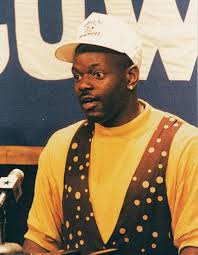 We get extended footage of Emmitt’s outrageous polka-dotted overalls shorts set he chose to wear for his arrival in Dallas and his opening press conference at Valley Ranch. And Michael Irvin’s laughing about it 35-years later is hilarious. And while we’ve known for years that Emmitt told people before his rookie season that he wanted to become the NFL’s all-time leading rusher, it’s funnier hearing Irvin talk about it. The Cowboys were coming off that 1-15 season when Emmitt made his personal goal public. Irvin just laughs when he remembers telling Smith, “All-time leading rusher? How about we just try to win a game?”
We get extended footage of Emmitt’s outrageous polka-dotted overalls shorts set he chose to wear for his arrival in Dallas and his opening press conference at Valley Ranch. And Michael Irvin’s laughing about it 35-years later is hilarious. And while we’ve known for years that Emmitt told people before his rookie season that he wanted to become the NFL’s all-time leading rusher, it’s funnier hearing Irvin talk about it. The Cowboys were coming off that 1-15 season when Emmitt made his personal goal public. Irvin just laughs when he remembers telling Smith, “All-time leading rusher? How about we just try to win a game?”
There’s a lot to process in this second episode. I’ve narrowed what I want to say into three sections: The memories, the lesson, the revelation, and the foreboding development.
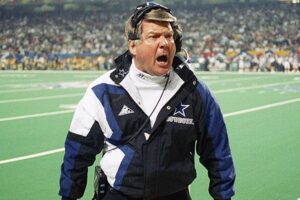 The Memories: I was at KHLB radio in Marble Falls during this era and the Cowboys were holding their summer training camps at St. Edward’s University in Austin, just 40 miles away. So two or three times a week I would finish the noon newscast and hustle down to Austin to make the afternoon practice. I saw those Jimmy Johnson practices up close; but I’ll never forget how I also heard them. The media parking lot was at least a hundred yards away from the practice fields, but as soon as I opened the door to my truck, I could hear Jimmy yelling and coaching. Loud. Intense. Hands-on. Involved in every aspect of what was happening on both sides of the ball and in every group’s drills. In the huddles, running back and forth between the offense and defense, giving high fives and forearm shivers. The Netflix show really captures Jimmy’s burning, always-on, over-the-top intensity. It’s the exact opposite of Barry Switzer’s demeanor a few years later when we would be watching a full-team practice and couldn’t find the head coach at all. Sometimes we reporters turned it into a game on the sidelines during a scrimmage: Where’s Barry? How long will it take us to find the coach? Inevitably, someone would locate him sitting in a golf cart in the shade, over by the stands, talking to a group of young women. The exact opposite of the Jimster.
The Memories: I was at KHLB radio in Marble Falls during this era and the Cowboys were holding their summer training camps at St. Edward’s University in Austin, just 40 miles away. So two or three times a week I would finish the noon newscast and hustle down to Austin to make the afternoon practice. I saw those Jimmy Johnson practices up close; but I’ll never forget how I also heard them. The media parking lot was at least a hundred yards away from the practice fields, but as soon as I opened the door to my truck, I could hear Jimmy yelling and coaching. Loud. Intense. Hands-on. Involved in every aspect of what was happening on both sides of the ball and in every group’s drills. In the huddles, running back and forth between the offense and defense, giving high fives and forearm shivers. The Netflix show really captures Jimmy’s burning, always-on, over-the-top intensity. It’s the exact opposite of Barry Switzer’s demeanor a few years later when we would be watching a full-team practice and couldn’t find the head coach at all. Sometimes we reporters turned it into a game on the sidelines during a scrimmage: Where’s Barry? How long will it take us to find the coach? Inevitably, someone would locate him sitting in a golf cart in the shade, over by the stands, talking to a group of young women. The exact opposite of the Jimster.
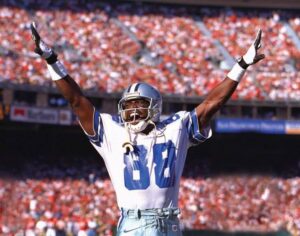 That intensity was there with Michael Irvin, too. I’m telling you right now, every practice I ever attended in six years at St. Ed’s and one summer at Midwestern State in Wichita Falls, without exception, every single time, Irvin was the very first one on the field and the absolute last one to leave. Every single practice. Running sprints. Working on routes. Catching balls. If Troy went in, he’d catch balls with Jason Garrett or Babe Laufenberg. If all the QBs called it a day, Irvin would catch passes from assistant coaches. Michael had/has the same personality as Jimmy, the same fire, the same commitment, the same burning passion to do whatever it takes to win. That’s why Jimmy loved/trusted him so much.
That intensity was there with Michael Irvin, too. I’m telling you right now, every practice I ever attended in six years at St. Ed’s and one summer at Midwestern State in Wichita Falls, without exception, every single time, Irvin was the very first one on the field and the absolute last one to leave. Every single practice. Running sprints. Working on routes. Catching balls. If Troy went in, he’d catch balls with Jason Garrett or Babe Laufenberg. If all the QBs called it a day, Irvin would catch passes from assistant coaches. Michael had/has the same personality as Jimmy, the same fire, the same commitment, the same burning passion to do whatever it takes to win. That’s why Jimmy loved/trusted him so much.
As for Charles Haley, he is every bit the awful person described in episode two. Jerry and Jimmy both call him the missing piece to those Super Bowl teams but, man, what they had to endure. I remember getting to St. Ed’s early one afternoon and watching while an intern walked up and down the sidelines of both fields, setting orange cones in a perfect line five yards apart. Haley saw what he was doing and began walking behind him, about 30 yards back, kicking every single cone as far as he could. Just to watch the poor kid pick them up and start all over again. Haley did things like this almost every day–he’d flip a table of Gatorade or turn a sack of footballs upside down just to make the interns or the assistants clean it up. Jerry has made a habit of trading for and/or signing troubled and troubling football players with major off-the-field issues. Haley was the first.
The best part of this episode is the famous “asthma field” outburst in all of its hilarious glory. Jimmy asks why a certain rookie is down on the ground during sprints. The rookie says, “I have asthma.” And Jimmy lost it. “Asthma!?! Get over on that other field and have some asthma! You’re on the wrong field to have asthma! Get out of here!” It’s so classic. So Jimmy Johnson. I hadn’t remembered that Jimmy was asked about it by reporters after practice. But Netflix has it. “I don’t want ‘I have asthma,'” Jimmy says, “I want the job done.”
Man, I do remember those practices and the way Jimmy coached. There was no doubting back then that he was completely in charge and his number one priority was winning football games.
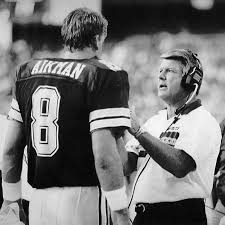 The Lesson: Jimmy Johnson did not go all-in with Troy Aikman immediately. It took a long time. It took too long. Troy got beat up and, eventually, injured during that brutal 1-15 rookie season in ’89. And Jimmy went with Steve Beuerlein for both of those first playoff games in ’91, even though Troy had recovered from his hyper-extended knee by week 16. Not to mention the drafting of Steve Walsh, Jimmy’s national championship winning quarterback from their days together in Miami. Troy never felt like he was truly “the guy,” and it was very nearly a catastrophic mistake. Troy talked to his agent about requesting a trade out of Dallas near the end of that ’91 season, and tells the Netflix cameras, “I think Jimmy misread, early on, how important winning was to me. How dedicated and motivated I was to win.”
The Lesson: Jimmy Johnson did not go all-in with Troy Aikman immediately. It took a long time. It took too long. Troy got beat up and, eventually, injured during that brutal 1-15 rookie season in ’89. And Jimmy went with Steve Beuerlein for both of those first playoff games in ’91, even though Troy had recovered from his hyper-extended knee by week 16. Not to mention the drafting of Steve Walsh, Jimmy’s national championship winning quarterback from their days together in Miami. Troy never felt like he was truly “the guy,” and it was very nearly a catastrophic mistake. Troy talked to his agent about requesting a trade out of Dallas near the end of that ’91 season, and tells the Netflix cameras, “I think Jimmy misread, early on, how important winning was to me. How dedicated and motivated I was to win.”
Troy and Jimmy do not have the same personalities. The same fire, the same passion to win, the same dedication to do whatever it takes to succeed–but not the same personalities. Troy is not the loud, in-your-face, rah-rah type, like Jimmy. The coach misread that as something other than what it was. And it nearly cost them everything. Aikman had everything Jimmy and Michael Irvin had–maybe more. It just wasn’t loud.
The lesson is one for all of us. I catch myself quite often judging a fellow-minister’s effectiveness or value to our mission according to how closely his or her personality matches mine. Why isn’t he loud and energetic? Why is she not excited about this? I’m wanting everybody to be like me. Good grief, how arrogant and short-sighted. And stupid. If everybody were like me, we’d all kill each other in about five minutes! And we would miss out on a variety of gifts and skills and ideas that make our team overall so much better. Don’t judge what’s inside a person or what they can bring to your team based on how closely their personality matches yours. As it turns out, Troy Aikman’s fire to win burned even deeper than Jimmy’s. It just manifested itself differently.
The Revelation: Michael Irvin tells Netflix that when Jimmy arrived in 1989, he gave his coach a list of all the players who needed to be cut, all the players who had grown complacent and lazy playing out the string under Tom Landry, the players who would not help Jimmy accomplish what they both wanted to accomplish. I have never heard this anecdote before. Never. He wrote the names on a piece of paper and gave it to Johnson. Evidently, Jeff Rohr’s name was on that list, but Jim Jeffcoat’s wasn’t. I assume Randy White’s name was on that list. Wow.
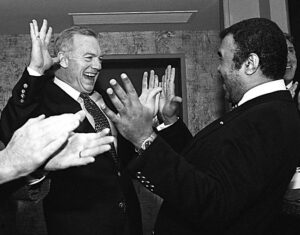 The Foreboding Development: Troy tells a story about the final regular season game in 1992, a home game against Chicago that clinched the NFC East with a 13-3 record, and the second seed in the playoffs. In the locker room after the game, Troy says Jimmy was about to give the team a speech congratulating them on the season, celebrating the division title, and pushing forward into the postseason. The more the Cowboys won, the more wound up and tight Jimmy got, but Troy says Jimmy was just about to let go. He was just about to cut loose and give the team the moment they wanted, the moment they needed, the admiration of their coach and a few minutes to revel in their accomplishment together. But as soon as Jimmy started, the locker room door opened and Jerry walked in with his friend, the Saudi Arabian Prince Bandar, and his 20-member entourage. Right into the middle of the sacred space, interrupting Jimmy and his football team. Troy says Jimmy stopped his speech, got a couple of things out of his locker, and left.
The Foreboding Development: Troy tells a story about the final regular season game in 1992, a home game against Chicago that clinched the NFC East with a 13-3 record, and the second seed in the playoffs. In the locker room after the game, Troy says Jimmy was about to give the team a speech congratulating them on the season, celebrating the division title, and pushing forward into the postseason. The more the Cowboys won, the more wound up and tight Jimmy got, but Troy says Jimmy was just about to let go. He was just about to cut loose and give the team the moment they wanted, the moment they needed, the admiration of their coach and a few minutes to revel in their accomplishment together. But as soon as Jimmy started, the locker room door opened and Jerry walked in with his friend, the Saudi Arabian Prince Bandar, and his 20-member entourage. Right into the middle of the sacred space, interrupting Jimmy and his football team. Troy says Jimmy stopped his speech, got a couple of things out of his locker, and left.
Yikes.
Episode two ends with the Cowboys beating the hated Eagles in the Divisional round and heading to San Francisco for the NFC Championship Game against the top-seeded 49ers. The last scene is Jerry Rice looking into the camera and saying, “The Dallas Cowboys thought they were going to come into Candlestick Park and win that football game. But, it’s not going to happen.”
Delicious.
Peace,
Allan
Leave a Reply